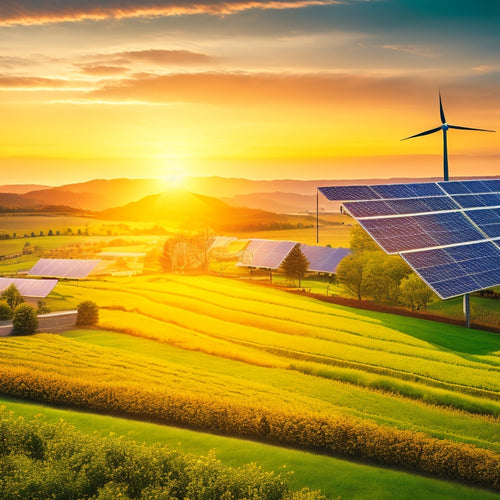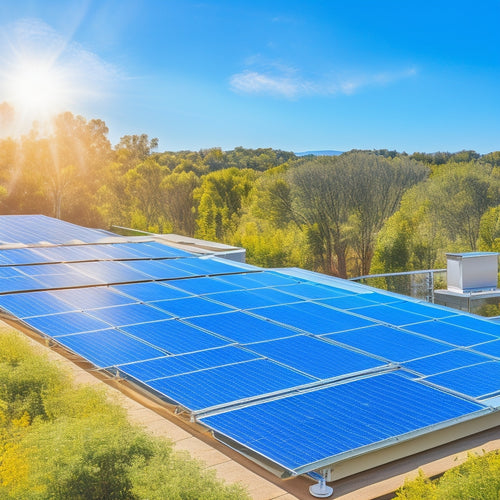
Cost of Solar Panel Installation for Home
Share
You're contemplating installing solar panels on your home, and one of the key factors holding you back is the cost of the installation process, which can range from $15,000 to $30,000 or more, depending on the system size and features. However, you'll benefit from reduced energy bills, potentially saving $50-$250 per month, depending on your system's size. Additionally, solar panels can increase your property's value, enhance its selling price, and provide a sustainable source of energy. As you weigh the costs, it's important to evaluate the long-term financial benefits, energy storage options, and roof assessment needs that can affect your overall investment - and there's more to investigate in making an informed decision.
The Essentials
- The average cost of solar panel installation for a home ranges from $15,000 to $30,000, depending on system size and quality.
- A 3 kW system can save $50-$75 in monthly energy bills, while a 10 kW system can yield savings of $150-$250.
- Energy storage solutions, like battery backup systems, can add $5,000 to $15,000 to the overall installation cost.
- Roof assessment is crucial, as shading and obstructions can impact energy production, and specialized equipment may be needed to mitigate these effects.
- Federal and state incentives, such as tax credits, can significantly reduce the upfront cost of solar panel installation, making it more affordable for homeowners.
Reduce Your Energy Bills
You can notably cut energy expenses by utilizing the power of solar energy. By generating your own electricity, you'll lower your monthly costs and reduce your reliance on the grid.
Additionally, with Renewable Energy Solutions, you can also take advantage of backup power during outages and emergencies, offering peace of mind and safeguarding against lost productivity and spoiled food.
With solar panels, you'll be able to enjoy a considerable decrease in your energy bills, freeing up more money in your budget for other essential expenses.
Cut Energy Expenses
As the cost of traditional energy sources continues to rise, switching to solar power can notably cut energy expenses for homeowners and businesses alike.
By generating your own clean energy, you can reduce your reliance on grid electricity, which not only saves you money but also contributes to a more sustainable living environment.
With a solar panel system, you can also mitigate the uncertainty of energy price fluctuations, offering a reliable and long-term solution renewable energy solutions.
You can considerably reduce your energy bills by utilizing the power of the sun.
Solar panels convert sunlight into electricity, allowing you to generate your own energy and reduce your reliance on the grid.
Lower Monthly Costs
Solar panel installation considerably reduces monthly energy bills by generating free electricity from sunlight. As a homeowner, you'll enjoy significant financial savings, which can be strategically allocated to other essential aspects of your monthly budgeting. By utilizing the sun's energy, you'll be less reliant on the grid, leading to a substantial decrease in your energy expenses.
Here's a breakdown of the average monthly savings for homeowners with solar panels:
| System Size | Average Monthly Savings | CO2 Emissions Reduction |
|---|---|---|
| 3 kW | $50-$75 | 3-5 tons/year |
| 5 kW | $80-$120 | 5-8 tons/year |
| 10 kW | $150-$250 | 10-15 tons/year |
With solar panels, you'll experience a noticeable reduction in your energy bills, allowing you to allocate funds to other important areas of your life. This newfound financial freedom enables you to take control of your monthly budgeting, making it easier to achieve your long-term goals.
Increases Property Value Fast
You'll see a rapid appreciation in value when you install solar panels, as they increase your property's worth quickly.
By integrating renewable energy systems into your home, you'll not only reduce your carbon footprint but also appeal to eco-conscious buyers.
In fact, studies show that solar panels can enhance your selling price by up to 17% more than similar homes without them.
With this significant increase in value, you'll be able to sell your property faster and at a higher price.
Rapid Appreciation in Value
One of the most significant benefits of installing solar panels is the rapid appreciation in value they bring to your property. This increase in value is a direct result of the growing demand for renewable energy sources and the positive impact on the environment. As you invest in solar panels, you're not only reducing your carbon footprint but also making a smart financial move.
The rapid appreciation in value is driven by solar market trends, which indicate a steady growth in the adoption of solar energy. This growth translates to increased investment returns for homeowners who install solar panels.
Here's a breakdown of the average increase in property value based on the size of the solar panel system:
| System Size (kW) | Average Increase in Property Value |
|---|---|
| 3-4 kW | 10-15% |
| 5-7 kW | 15-20% |
| 8-10 kW | 20-25% |
| 11-15 kW | 25-30% |
| 16+ kW | 30-35% |
As you can see, the larger the system, the greater the increase in property value. This rapid appreciation in value not only benefits you but also future homeowners, making your property more attractive and desirable.
Boosts Selling Price Fast
By installing solar panels, homeowners can reap the benefits of a rapid increase in their property's selling price, which can be a significant factor in the decision to invest in renewable energy.
You'll be pleased to know that solar panels can enhance your property's value by up to 17%, making it more attractive to potential buyers. This is especially true in areas with strong solar market trends, where home buyer preferences are shifting towards eco-friendly and sustainable living.
As a homeowner, you can capitalize on this trend by installing solar panels, which won't only reduce your carbon footprint but also increase your property's resale value.
In fact, a study by the National Renewable Energy Laboratory found that solar panels can add up to $15,000 to a home's selling price. This is a significant return on investment, considering the average cost of solar panel installation.
Efficient Energy Storage Systems
You'll want to contemplate efficient energy storage systems to maximize your solar panel installation's benefits.
Having a reliable solar battery backup system for home, such as those offering off grid energy solutions, can guarantee a consistent power supply during outages.
Battery backup systems and energy storage solutions are essential components that enable you to store excess energy generated during the day for use during the night or when the grid is down.
Battery Backup Systems
With the rise of intermittent renewable energy sources, efficient energy storage systems have become crucial to secure a stable and reliable power supply.
As you evaluate solar panel installation for your home, you'll want to investigate battery backup systems that can store excess energy generated by your solar panels during the day for use at night or during power outages.
You have several solar battery types to choose from, including lead-acid, lithium-ion, and saltwater batteries. Each type has its pros and cons, so it's important to research and compare their features, such as depth of discharge, cycle life, and warranty.
When selecting a battery backup system, you'll also need to take into account installation costs, which can range from $5,000 to $15,000 or more, depending on the size and type of system you need.
Keep in mind that installation costs may vary depending on your location, the complexity of the installation, and the installer's rates.
Be sure to factor in any additional costs, such as monitoring and maintenance, to ascertain your battery backup system operates at its best.
Energy Storage Solutions
Optimize your solar panel installation with efficient energy storage solutions that guarantee a seamless shift between grid power and backup energy. This setup guarantees you can store excess energy generated by your solar panels during the day for use during the night or when the grid is down. Efficient energy storage solutions also enable you to maximize your solar panel efficiency, reducing your reliance on the grid and minimizing your environmental impact.
| Energy Storage Solution | Benefits | Considerations |
|---|---|---|
| Lithium-ion Batteries | High energy density, long lifespan | Higher upfront cost, maintenance requirements |
| Lead-acid Batteries | Cost-effective, widely available | Lower energy density, shorter lifespan |
| Flow Batteries | Scalable, flexible design | Higher maintenance costs, complex installation |
When selecting an energy storage solution, consider factors such as installation incentives, financing options, and installation timeline. With the right solution, you can achieve grid independence, energy autonomy, and a reduced environmental impact. Take advantage of technology advancements and renewable resources to optimize your solar panel installation and enjoy the freedom that comes with it.
Assess Your Roof's Shading
You'll need to assess your roof's shading to determine the ideal placement of solar panels.
Reflect on the obstructions on your roof, such as skylights, vents, and chimneys, which can cast shadows and reduce energy production.
When evaluating your roof's shading, it's crucial to examine photovoltaics and energy efficiency solutions to maximize your solar panel's potential.
Additionally, analyze the shading patterns on your roof over time, considering the changing angles of the sun throughout the day and year.
Roof Obstructions to Consider
Evaluating your roof's shading is essential when determining the feasibility of a solar panel installation. You need to take into account roof obstructions that can impact the performance of your solar panels. These obstructions can affect the amount of energy your system produces, leading to reduced savings on your electricity bill.
Some common roof obstructions to take into account are:
| Obstruction | Impact on Solar Panels |
|---|---|
| Trees | Can cast shade on solar panels, reducing energy production |
| Vents | Can block sunlight from reaching solar panels |
| Skylights | Can create shade and reduce energy production |
| Chimneys | Can cast shade and create installation challenges |
| Power lines | Can create installation challenges and impact panel placement |
When evaluating your roof's shading, take into account the roof orientation and panel placement to minimize the impact of these obstructions. A south-facing roof with little to no shading is ideal for solar panel installation. However, if your roof has obstructions, you can still install solar panels, but you may need to adjust the panel placement or use specialized equipment to maximize energy production.
Shading Patterns Over Time
As you consider the impact of roof obstructions on your solar panel installation, it's equally important to assess how shading patterns change over time.
Shading analysis is vital to understanding the effects of seasonal shading on your solar panel system's performance.
Shading optimization is critical to maximizing energy production. Since shading impacts vary throughout the year, it's important to evaluate the shading effects on your roof during different seasons.
For instance, trees may cast longer shadows during winter, reducing energy output. Conversely, summer months may bring more sunlight, but also increased shading from foliage.
To mitigate these shading effects, shading solutions such as trimming trees or installing bifacial solar panels can be employed.
Advanced shading technologies can also be used to evaluate and optimize your solar panel installation. A thorough shading evaluation will help you identify the best shading solutions for your unique situation, ensuring you get the most out of your solar panel system.
Zero Carbon Footprint Promise
You're likely considering solar panels because you want to reduce your carbon footprint.
By installing solar panels, you'll greatly decrease your reliance on fossil fuels, which are a major contributor to greenhouse gas emissions.
With a solar panel system, you can expect to reduce your carbon emissions by up to 3,000 pounds per year, depending on your energy usage and system size.
Carbon Emission Reduction
One notable advantage of solar panel installation is its potential to reduce carbon emissions dramatically, clearing the path towards a zero-carbon footprint. By utilizing the power of solar energy, you'll considerably decrease your reliance on fossil fuels, which are a major contributor to greenhouse gas emissions.
As you generate clean energy, you'll be doing your part to mitigate the environmental impact of climate change.
Thanks to rapid solar technology advancements, the efficiency of solar panels has increased greatly, allowing you to produce more energy while reducing your carbon footprint. In fact, a typical residential solar panel system can reduce carbon emissions by up to 3,000 pounds per year – equivalent to planting over 100 trees annually.
By choosing solar, you're not only cutting your energy bills but also contributing to a cleaner, healthier environment for future generations.
With solar panel installation, you'll be taking a considerable step towards achieving a zero-carbon footprint, promoting energy independence, and securing a sustainable future.
Frequently Asked Questions
Can I Install Solar Panels Myself to Save Money?
You can attempt a DIY solar installation, but be prepared to traverse complex installation permits and guarantee compliance with local building codes, which can be time-consuming and may void your warranty if not done correctly.
Do Solar Panels Work During Power Outages?
You're wondering if solar panels work during power outages; the answer is, they don't, unless you have battery storage. With grid independence, you can store excess energy and use it when the grid goes down, ensuring you're always powered up.
How Long Does It Take to Install Solar Panels?
As you flip the hourglass, grains of time trickle down, symbolizing the wait. You'll typically spend 3-5 days observing the installation process unfold, with the actual installation timeline taking around 1-3 days, depending on your roof's complexity and the team's proficiency.
Are Solar Panels Covered by Homeowner's Insurance?
You'll likely find that your solar panels are covered by your homeowner's insurance policy, but you'll need to review your policy limits to guarantee you have sufficient insurance coverage for the full value of your system.
Can I Finance My Solar Panel Installation?
"Don't wait for opportunity, create it" - and you can do just that by exploring solar financing options, which offer flexible payment plans, allowing you to utilize the power of the sun while managing your budget, and ultimately, achieving energy independence.
Final Thoughts
You've made the smart decision to utilize the power of solar energy. Now, you're one step closer to reducing your energy bills, increasing your property value, and storing energy efficiently. By evaluating your roof's shading, you'll maximize your solar panel installation's potential. And, with a zero-carbon footprint promise, you'll be contributing to a sustainable future. The cost of solar panel installation may seem overwhelming, but the long-term benefits far outweigh the initial investment. You'll be saving money and the planet – a win-win situation.
Related Posts
-

Net Metering in Renewable Energy's Future
Net metering's future is vital for driving renewable energy growth and financial savings. You can reduce your electri...
-

What Types of Solar Energy Devices Are Available
You'll find several types of solar energy devices available today, each customized to different energy needs. Photovo...
-

Essential Hiking Lights for Safety and Fun
When you're hitting the trails, essential hiking lights are vital for safety and fun. A lightweight headlamp offers h...


